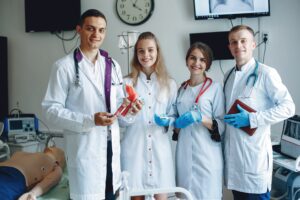Improving patient assessment skills and clinical judgment is important for medical students to perform at their best in a clinical setting. Basically, they are foundational skills, you will be using as a practicing doctor. By polishing your patient assessment skills and clinical competency, you can obtain good marks in your medical school examinations and shelf exams. Patient assessment involves the process of clinical thinking and clinical reasoning to make better diagnosis and treatment plans.
By carefully analyzing the data and patient’s symptoms, you can make appropriate decisions to optimize patient outcomes. For many medical students, it is difficult to apply their medical knowledge in the fast-paced and ever-changing clinical settings. Many medical graduates and nurses failed to show clinical competency. Some are unable to show their clinical judgment skills and translate medical knowledge into practice.
Lack of practical proficiency is the only reason why medical students are unable to carefully evaluate a patient’s condition. If you are an aspiring doctor and want to improve patient assessment skills, here are some tips and tricks for medical students to develop good health assessment competencies.
Why Developing Good Patient Assessment Skills is Important for Medical Students?
Whether you are a medical student, resident, or practicing doctor, having strong health assessment skills are the foundation of your clinical abilities and competencies. As a doctor, you know how to interact with patients and identify their symptoms to make an accurate diagnosis. Basically, having strong assessment skills will help you gather patient’s important data and apply your medical knowledge to make a better diagnosis and treatment plan. By taking a patient’s medical history, performing a physical exam, and interpreting medical tests, you can cultivate your health assessment skills.
When medical students start their clinical rotations, they will start learning how to interact with patients, and treat them. You will get the opportunity to hone your patient assessment skills during the residency training years as you apply medical knowledge in a variety of clinical settings.
How to Polish Patient Assessment Skills?
Developing strong patient assessment skills is not important for achieving academic success in medical school but professional success in diverse clinical settings. Let’s figure out how you can develop patient assessment skills and become a good medical student and a competent practicing doctor.
Observe Patients Carefully
When you are performing a physical examination, make sure to notice every little sign and symptoms. Ignoring little warning signs will lead to wrong diagnosis or poor treatment plan, which is not good for a patient’s health. Make sure to note every small or insignificant symptom to figure out the medical condition and create an effective treatment plan.
Take a Detailed Patient’s History
Introduce yourself to the patient and start taking the patient’s history to get all the clues to figure out the current problem. Taking medical history is one of the most important duties of medical students, residents and practicing doctors, no matter which medical specialty you choose. Ask all the possible questions during the history taking process and gain as much information as you can about the medical condition. It will help you draw the right conclusion and create a better treatment plan.
Interact with Patients
When you perform clinical rotations and work in different clinical settings, you will get the opportunity to interact with patients. Make them feel welcome and comfortable to establish trust and respect. It will improve doctor-patient relationship and calm the patient’s nerves. Try to be a good listener to show the patient you actually care and understand. By carefully listening to the patients, you will be able to identify the symptoms and discover important information related to the complaint.
Work Effectively with a Medical Team
It is one of the most effective ways to boost your health assessment skills. When you work in a clinical setting, you will work with a medical team and the ultimate goal is to provide excellent patient care. Discuss the medical case with your colleagues and seek a second opinion. It will help confirm your assessment and avoid any uncertainties. For medical students and residents, a healthcare team acts as huge support to polish your assessment skills.
Observe Carefully
Mastering health assessment skills will become easier when you carefully watch and observe everything. Put your best efforts into learning from your seniors, observe them and learn which medical techniques, clinical tips, and tricks they use to treat patients. Implement what you have learned when practicing independently or interacting with patients.
Final Thoughts
Whether you are a premedical or medical student, resident or practicing physician, tuning up your patient assessment skills can help you provide excellent patient care. When you get into medical school, you will get a number of opportunities to improve your patient assessment skills by performing clinical clerkships, getting residency training. Developing a deeper understanding of patients and knowing their symptoms will help you provide emotional support and improved patient experience. Following these effective strategies will definitely help prepare you for clinical rotations, residency years, and become a good practicing doctor.








